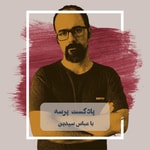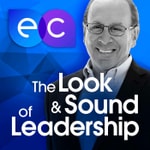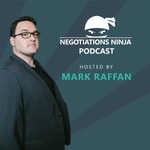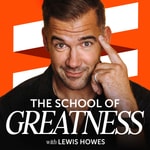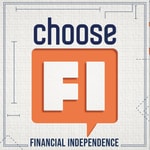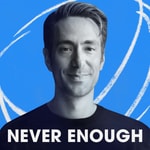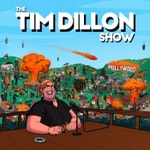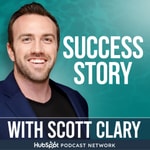Clearer Thinking with Spencer Greenberg – Details, episodes & analysis
Podcast details
Technical and general information from the podcast's RSS feed.
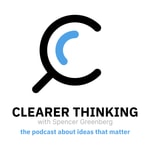
Clearer Thinking with Spencer Greenberg
Spencer Greenberg
Frequency: 1 episode/6d. Total Eps: 272

Recent rankings
Latest chart positions across Apple Podcasts and Spotify rankings.
Apple Podcasts
🇨🇦 Canada - socialSciences
29/07/2025#21🇬🇧 Great Britain - socialSciences
29/07/2025#28🇺🇸 USA - socialSciences
29/07/2025#29🇨🇦 Canada - socialSciences
28/07/2025#29🇬🇧 Great Britain - socialSciences
28/07/2025#60🇺🇸 USA - socialSciences
28/07/2025#28🇨🇦 Canada - socialSciences
27/07/2025#22🇬🇧 Great Britain - socialSciences
27/07/2025#42🇩🇪 Germany - socialSciences
27/07/2025#76🇺🇸 USA - socialSciences
27/07/2025#30
Spotify
No recent rankings available
Shared links between episodes and podcasts
Links found in episode descriptions and other podcasts that share them.
See all- https://twitter.com
1372 shares
- https://twitter.com/davidmcraney
95 shares
- https://twitter.com/ByrneHobart
37 shares
- https://www.instagram.com/jaysongaddis
165 shares
- https://www.instagram.com/lallabird
16 shares
RSS feed quality and score
Technical evaluation of the podcast's RSS feed quality and structure.
See allScore global : 53%
Publication history
Monthly episode publishing history over the past years.
Decision-making and play-testing (with Dan Epstein)
mercredi 28 août 2024 • Duration 01:09:56
Read the full transcript here.
What sorts of decisions are we making without even realizing we're making them? Are people aware of their own values? Do they know how those values rank relative to each other? What are all the various parties, interests, and values that have to be addressed and balanced when making decisions in a healthcare context? What does it mean to "play-test" yourself? What are the best strategies for giving feedback? How much energy is required to make various kinds of decisions? How can we practice and get better at decision-making? What is "tabletop exercising"? What are the most effective ways to bring other people into the decision-making process? What are some aspects of games that ought to be put to good use in non-game contexts? Why are educational games usually neither fun nor educational? How can game design features be used in ways that avoid turning metrics into targets? How can we make better decisions about how to divvy up our time?
Dr. Dan Epstein is a practicing medical doctor and academic PhD focusing on decision-making and game design. Dan is the director of The Long Game Project, which helps businesses and leaders improve strategy and decision-making with games and tabletop exercises. Dan is also an ambassador for Giving What We Can, a community of people who pledge to donate a portion of their income to effective causes; and he's a member of High Impact Athletes, a community of current and past athletes who do the same. Follow him on Twitter at @drdanepstein, email him at [email protected], connect with him on LinkedIn, or learn more about his work at longgameproject.org.
Further reading
- The Long Game Project newsletter
- The Long Game Project YouTube channel
- Foundations of Tabletop Exercising: Design Exercises for Real Impact — a free course taught by Dan
Staff
- Spencer Greenberg — Host / Director
- Josh Castle — Producer
- Ryan Kessler — Audio Engineer
- Uri Bram — Factotum
- WeAmplify — Transcriptionists
Music
Affiliates
[Read more]The path to utopia (with Nick Bostrom)
samedi 24 août 2024 • Duration 01:03:54
Read the full transcript here.
Why do there seem to be more dystopias than utopias in our collective imagination? Why is it easier to find agreement on what we don't want than on what we do want? Do we simply not know what we want? What are "solved worlds", "plastic worlds", and "vulnerable worlds"? Given today's technologies, why aren't we working less than we potentially could? Can humanity reach a utopia without superintelligent AI? What will humans do with their time, and/or how will they find purpose in life, if AIs take over all labor? What are "quiet" values? With respect to AI, how important is it to us that our conversation partners be conscious? Which factors will likely make the biggest differences in terms of moving the world towards utopia or dystopia? What are some of the most promising strategies for improving global coordination? How likely are we to end life on earth? How likely is it that we're living in a simulation?
Nick Bostrom is a Swedish-born philosopher with a background in theoretical physics, computational neuroscience, logic, and artificial intelligence, along with philosophy. He's been a Professor at Oxford University, where he served as the founding Director of the Future of Humanity Institute from 2005 until its closure in April 2024. He is currently the founder and Director of Research of the Macrostrategy Research Initiative. Bostrom is the author of over 200 publications, including Anthropic Bias (2002), Global Catastrophic Risks (2008), Human Enhancement (2009), and Superintelligence: Paths, Dangers, Strategies (2014). His work has pioneered many of the ideas that frame current thinking about humanity's future (such as the concept of an existential risk, the simulation argument, the vulnerable world hypothesis, the unilateralist's curse, etc.), while some of his recent work concerns the moral status of digital minds. His most recent book, Deep Utopia: Life and Meaning in a Solved World, was published in March of 2024. Learn more about him at his website, nickbostrom.com.
Staff
- Spencer Greenberg — Host / Director
- Josh Castle — Producer
- Ryan Kessler — Audio Engineer
- Uri Bram — Factotum
- WeAmplify — Transcriptionists
Music
Affiliates
[Read more]Raising our happiness baseline (with Sasha Chapin)
mercredi 19 juin 2024 • Duration 01:21:13
Read the full transcript here.
How easy is it to shift our baseline level of happiness? What sorts of things can most effectively shift that baseline? And are they highly specific to each individual or generalizable to most people? What are the differences between conceptual and phenomenal self-love? Why might it be useful to view shame as a kink? How does self-love or self-acceptance differ from indulging or even just tolerating the worst parts of yourself? What's the best way to think about "woo"? How genuine is the stereotypical guru demeanor of serenity, graciousness, and attentiveness? Is it possible for people with aphantasia to learn visualization? What's so interesting about perfume? What can people do to become better writers?
Sasha Chapin is a writer currently living in California. Most of his recent writing is on his Substack. His most popular posts there are "What the humans like is responsiveness" and "50 Things I Know". He also wrote a book called All the Wrong Moves: A Memoir About Chess, Love, and Ruining Everything. Learn more about him at his website, sashachapin.com, or follow him on Twitter / X at @sashachapin.
Further reading
- Cate Hall's Clearer Thinking episode
- Loch Kelly's Clearer Thinking episode
- Mind's Eye Development eCourse — the course that helped Sasha overcome aphantasia
- Loving What Is: Four Questions That Can Change Your Life, by Byron Katie
- Expanding Awareness, by Michael Ashcroft
- Difficult Conversations: How to Discuss What Matters Most, by Douglas Stone, Bruce Patton, and Sheila Heen
Staff
- Spencer Greenberg — Host / Director
- Josh Castle — Producer
- Ryan Kessler — Audio Engineer
- Uri Bram — Factotum
- WeAmplify — Transcriptionists
Music
Affiliates
[Read more]Inventions, stories, and ideas that don't matter (with Pablos Holman)
mercredi 5 octobre 2022 • Duration 01:26:36
Read the full transcript here.
How does 3D-printed food work? How do hackers and inventors think? What are some ideas that don't matter? Why are humans so driven by stories? What are the current sentiments around nuclear energy? What is an "information DMZ"? Is "cryptocurrency regulation" a contradiction in terms? What are "deep" and "shallow" technologies? How could we handle intellectual property rights more fairly?
Pablos is a hacker and inventor that runs Deep Future, a venture capital firm backing mad scientists, rogue inventors, crazy hackers, and maverick entrepreneurs who are implementing science fiction, solving big problems, and helping our species become better ancestors. Pablos is a top public speaker on technology whose TED Talks have over 30 million views. With his Deep Future Podcast, Pablos is sharing his conversations with people who understand the biggest problems in the world and the technologies that could help us solve them. Follow him on Twitter at @pablos, email him at [email protected], or find out more about him at deepfuture.tech.
Staff
- Spencer Greenberg — Host / Director
- Josh Castle — Producer
- Ryan Kessler — Audio Engineer
- Uri Bram — Factotum
- Janaisa Baril — Transcriptionist
Music
Affiliates
[Read more]Humble-bragging, counter-signalling, and impression management (with Övül Sezer)
mercredi 28 septembre 2022 • Duration 01:05:04
Read the full transcript here.
What should we do (or not do) to make a good first impression on others? Is "humble-bragging" better or worse than straightforward bragging? Or is completely hiding our successes an even better strategy than humble-bragging or straightforward bragging? When do our attempts to signal something about ourselves actually end up signalling something else that we don't intend? What are some long-term strategies for gaining others' respect?
Övül Sezer is a behavioral scientist, stand-up comedian, and Visiting Assistant Professor at Columbia University, Columbia Business School. She received her A.B. in Applied Mathematics and her Ph.D in Organizational Behavior from Harvard University. Follow her on Twitter at @ovulsezer or learn more about her at ovulsezer.com.
Staff
- Spencer Greenberg — Host / Director
- Josh Castle — Producer
- Ryan Kessler — Audio Engineer
- Uri Bram — Factotum
- Janaisa Baril — Transcriptionist
Music
Affiliates
[Read more]Ambition and expected value at extremes (with Habiba Islam)
mercredi 21 septembre 2022 • Duration 01:05:39
Read the full transcript here.
Are ambition and altruism compatible? How ambitious should we be if we want to do as much good in the world as possible? How should we handle expected values when the probabilities become very small and/or the values of the outcomes become very large? What's a reasonable probability of success for most entrepreneurs to aim for? Are there non-consequentialist justifications for longtermism?
Habiba Islam is an advisor at 80,000 Hours where she talks to people one-on-one, helping them to pursue high impact careers. She previously served as the Senior Administrator for the Future of Humanity Institute and the Global Priorities Institute at Oxford. Before that she qualified as a barrister and worked in management consulting at PwC specialising in operations for public and third sector clients. Follow her on Twitter at @FreshMangoLassi or learn more about her work at 80,000 Hours at 80000hours.org.
Staff
- Spencer Greenberg — Host / Director
- Josh Castle — Producer
- Ryan Kessler — Audio Engineer
- Uri Bram — Factotum
- Janaisa Baril — Transcriptionist
Music
Affiliates
[Read more]Career science, open science, and inspired science (with Alexa Tullett)
mercredi 14 septembre 2022 • Duration 01:20:52
Read the full transcript here.
How much should we actually trust science? Are registered reports more trustworthy than meta-analyses? How does "inspired" science differ from "open" science? Open science practices may make research more defensible, but do they make it more likely to find truth? Do thresholds (like p < 0.05) represent a kind of black-and-white thinking, since they often come to represent a binary like "yes, this effect is significant" or "no, this effect is not significant"? What is "importance laundering"? Is generalizability more important than replicability? Should retribution be part of our justice system? Are we asking too much of the US Supreme Court? What would an ideal college admissions process look like?
Alexa Tullett is a social psychologist who works at the University of Alabama. Her lab examines scientific, religious, and political beliefs, and the factors that facilitate or impede belief change. Some of her work takes a meta-scientific approach, using psychological methods to study the beliefs and practices of psychological scientists. Learn more about her at alexatullett.com, or send her an email at [email protected].
Staff
- Spencer Greenberg — Host / Director
- Josh Castle — Producer
- Ryan Kessler — Audio Engineer
- Uri Bram — Factotum
- Janaisa Baril — Transcriptionist
Music
Affiliates
[Read more]Estimating the long-term impact of our actions today (with Will MacAskill)
mercredi 7 septembre 2022 • Duration 01:06:27
Read the full transcript here.
What is longtermism? Is the long-term future of humanity (or life more generally) the most important thing, or just one among many important things? How should we estimate the chance that some particular thing will happen given that our brains are so computationally limited? What is "the optimizer's curse"? How top-down should EA be? How should an individual reason about expected values in cases where success would be immensely valuable but the likelihood of that particular individual succeeding is incredibly low? (For example, if I have a one in a million chance of stopping World War III, then should I devote my life to pursuing that plan?) If we want to know, say, whether protests are effective or not, we merely need to gather and analyze existing data; but how can we estimate whether interventions implemented in the present will be successful in the very far future?
William MacAskill is an associate professor in philosophy at the University of Oxford. At the time of his appointment, he was the youngest associate professor of philosophy in the world. A Forbes 30 Under 30 social entrepreneur, he also cofounded the nonprofits Giving What We Can, the Centre for Effective Altruism, and Y Combinator–backed 80,000 Hours, which together have moved over $200 million to effective charities. He's the author of Doing Good Better, Moral Uncertainty, and What We Owe The Future.
Staff
- Spencer Greenberg — Host / Director
- Josh Castle — Producer
- Ryan Kessler — Audio Engineer
- Uri Bram — Factotum
- Janaisa Baril — Transcriptionist
Music
Affiliates
[Read more]The differences between analytic and continental philosophy (with Alexander Prescott-Couch)
mercredi 31 août 2022 • Duration 01:16:37
Read the full transcript here.
What is the genetic fallacy? How do the analytic and continental philosophical traditions differ? What is the role and value of intuition in analytic philosophy? Is continental philosophy too poetic for its own good?
Alexander Prescott-Couch is an Associate Professor of Philosophy at the University of Oxford. He is currently writing a book on genealogy that is under contract with Oxford University Press. His academic work has appeared in journals such as Noûs and Journal of Political Philosophy, and he contributes to a regular interview column in the ZeitMagazin. Email him at [email protected] or follow him on Twitter at @prescottcouch.
Staff
- Spencer Greenberg — Host / Director
- Josh Castle — Producer
- Ryan Kessler — Audio Engineer
- Uri Bram — Factotum
- Janaisa Baril — Transcriptionist
Music
Affiliates
[Read more]Voting method reform in the US (with Aaron Hamlin)
mercredi 24 août 2022 • Duration 01:17:39
Read the full transcript here.
Does the US have one of the worst implementations of democracy in the world? Why do people sometimes seem to vote against their own interests? Is it rational for them to do so? How robust are various voting systems to strategic voting? What sorts of changes would we notice in the US if we suddenly switched to other voting systems? How hard would it be to migrate from our current voting systems to something more robust and fair, and what would be required to make that happen? Are centrist candidates always boring?
Aaron Hamlin is the executive director and co-founder of The Center for Election Science. He's been featured as an electoral systems expert on MSNBC.com, NPR, Free Speech TV, Inside Philanthropy, 80K Hours, and Popular Mechanics; and he has given talks across the country on voting methods. He's written for Deadspin, USA Today Magazine, Independent Voter Network, and others. Additionally, Aaron is a licensed attorney with two additional graduate degrees in the social sciences. You can learn more about The Center for Election Science at [electionscience.org(https://electionscience.org/) and can contact Aaron at [email protected].
Staff
- Spencer Greenberg — Host / Director
- Josh Castle — Producer
- Ryan Kessler — Audio Engineer
- Uri Bram — Factotum
- Janaisa Baril — Transcriptionist
Music
Affiliates
[Read more]